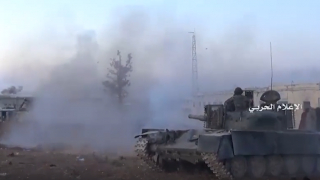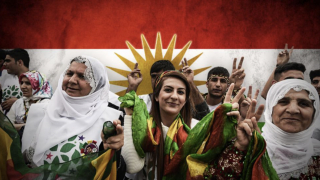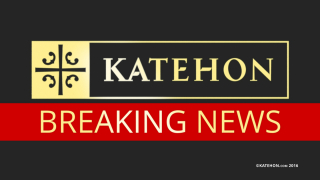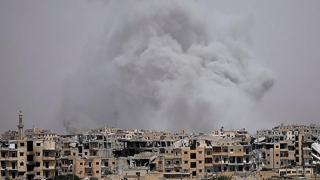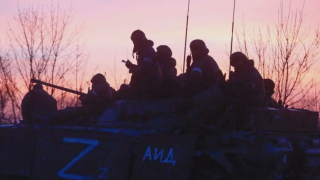Spreading of war by NATO powers in Syria and Libya
Information published in Iran in October 2012, most probably supplied by the Iranian special service, the Ministry of Intelligence and Security (MOIS), stated that the Western powers with the support of their Persian Gulf allies had tasked the American military group, Blackwater, with the goal of occupying Aleppo with mercenaries which is one of Syria's major cities.
Members of Blackwater were to train anti-Syrian government forces in Aleppo, northern Syria, with the overall aim of securing regime change in the capital city Damascus just over 200 miles south of Aleppo. The method was to be similar to the 2011 overthrow of Libyan leader Muammar Gaddafi, who was murdered on October 20th of that year by NATO-backed forces.
The Turkish newspaper Idinik reported in August 2012 that Blackwater agents were active along the border between Turkey and Syria, and they were furthermore entering northern Syria. Blackwater had established military training camps on the Turkish-Syrian frontier areas, where they were training Islamic insurgents who wanted to oust the Bashar al-Assad government.
Syrian security personnel in Homs in western Syria said the CIA was inciting revolts in the country alongside Mossad of Israel and Blackwater. By August 2012 Blackwater reportedly had over 6,000 mercenaries involved in operations against Damascus.
According to the Syrian strategic affairs expert, Salim Harba, intelligence agents from America, France, Qatar, Saudi Arabia and Israel, were to convene in Qatar with the support of the Syrian opposition and Blackwater members to co-ordinate activities against Syria's government.
Blackwater created a headquarters in the southern Turkish city of Adana, less than 100 miles from Syria's border and beside the US-run air base at Incirlik, where the CIA and the US Defense Intelligence Agency (DIA) had established an information centre since the unrest in Syria started at the beginning of 2011.
American-Israeli analyst Aaron Klein said during a broadcast with the radio station, 77 WABC, that the US ambassador to Libya Christopher Stevens, who was killed as a result of an armed attack by Islamic militants in Benghazi, Libya in September 2012, had played a key part in recruiting jihadists to fight against Syrian government units.
Klein stressed that information passed on by Egyptian security personnel to the American outlet WND (WorldNetDaily) had revealed this. Based on such intelligence Klein, who has written extensively for WND, outlined that ambassador Stevens through co-operating with Saudi Arabia helped to co-ordinate the hiring of Islamic militants from Libya and other parts of North Africa to fight in Syria.
Regarding Libya, Bruce Riedel, an ex-CIA officer and advisor to US president Barack Obama, told the Hindustan Times based in India that it was certain the Libyan Islamic Fighting Group (LIFG), a terrorist organisation closely aligned to Al-Qaeda, had partaken in the war against Libyan government troops in 2011. Riedel said the LIFG was Gaddafi's greatest enemy. The LIFG commander in 2011 was Abu Yahya al-Libi, a terrorist from Libya aged in his late 40s.
With the killing of Osama bin Laden in northern Pakistan on 2 May 2011, a reality which even Al-Qaeda's high command acknowledged later that week, Al-Libi became the second highest ranking Al-Qaeda member behind its new leader Ayman al-Zawahiri. Bin Laden's death at the hands of US special forces on the above date was confirmed too that same week by other Al-Qaeda members in Pakistan, Yemen and elsewhere in the Arabian Peninsula. The Taliban in Pakistan and Afghanistan stated a few days after the assassination that Bin Laden had indeed been killed on the date in question.
The LIFG terrorists, supported and armed by NATO during the conflict against the Libyan government in 2011, had a leading role in the latter's demise. It would not have been possible to topple Gaddafi without the combined efforts of NATO, Al-Qaeda and its Libyan branch the LIFG.
Al-Libi also publicly endorsed the attempted overthrow of the Syrian government. He demanded in a video that jihadists from Middle East countries "go to help their brothers" in Syria. The video was produced after November 2011 and released by Al-Qaeda affiliated media.
More than 10,000 Libyan insurgents were undergoing training in a closed-off area of Jordan in February 2012, as reported by the Russian news organisation, RT. The majority of the Libyans being trained in Jordan, which shares a northern border with Syria, were involved the previous year in the toppling of Gaddafi. These Libyans, who were funded by Saudi Arabia and Qatar to partake in the Syrian conflict, would then cross the frontier into Syria to fight for the opposition.
Bin Laden provided heavy support for the insurrections taking place in Syria and Libya in 2011, sending Al-Qaeda militants to both countries early that year. In February 2011, Gaddafi named Bin Laden as one of the main instigators of the disorder in Libya and he blamed rampant terrorism for being behind the revolts.
Before the NATO military attack on Libya was launched in March 2011, Libya's population had enjoyed the best living standards in Africa. There was obviously no cause for a nationwide uprising. Any discord that did exist was artificially sustained and increased by large-scale outside interference.
In letters Bin Laden wrote a few weeks before his death, the Al-Qaeda boss described the rebellions occurring in Arab countries as "a great and glorious event" and an "important point in our modern history". Bin Laden revealed that Al-Qaeda members already entered Libya in the early spring of 2011, and new Al-Qaeda fighters were about to assail the country while others were undergoing training in Algeria which borders Libya to the west.
An Al-Qaeda commander present in Derna in north-eastern Libya informed Bin Laden in late March 2011 that fresh Al-Qaeda militants had joined them over the past week, and that others from abroad wanted to travel to Libya. In the first half of 2011 Bin Laden's successor, Zawahiri, sent veteran terrorists to Libya in order to help copper-fasten Al-Qaeda's presence in the country.
Relating to Syria, in July 2011 and February 2012 Zawahiri released videos backing the insurgency there too. He called for jihadists from states like Iraq, Jordan and Lebanon to join the Al-Qaeda-supported insurrection against Syria's government. Damascus blamed Al-Qaeda for the increasing incidents of suicide bombings taking place in Syria. American officials conceded in February 2012 that the recent suicide bombings unleashed in Damascus and Aleppo were perpetrated by Al-Qaeda. Opposition "activists" blamed the Syrian authorities for the attacks.
Russia's deputy ambassador at the United Nations in Geneva, Mikhail Lebedev, said in March 2012 the opposition forces in Syria had committed widespread attacks against non-military infrastructure such as hospitals and schools, and that they were deliberately targeting civilians. He also said "Most of the militants are directly or closely affiliated with Al-Qaeda", and that more than 15,000 foreign jihadists had entered Syria through illegal routes. During August 2012, at least 500 mujahideen fighters who before had come from Afghanistan were killed in battles against Syrian soldiers.
The Western powers, most of all the US, Britain, France and Germany continued to support the anti-Syrian government forces, despite the "moderates" consisting of vast numbers of terrorists.
Had NATO possessed any sort of moral standing they would have stopped supporting the opposition, in Syria and Libya, when it was clear that many of the insurgents were actually extremists who had arrived from a variety of countries. Nothing of the sort unfolded. In Syria and Libya, the Western powers and terrorist organisations like Al-Qaeda were effectively on the same side which it is necessary to repeat.
Representatives from the US, Britain and France kept up with the deception at the UN Security Council, blaming the authorities in Damascus for the atrocities that were occurring in Syria.
At the same time special forces and intelligence services of the Western powers, such as the British MI6, Special Air Service (SAS) and Germany's BND, had been authorised to gather intelligence and monitor gun fights between Syrian government troops and the opposition, including the Western-backed Free Syrian Army (FSA), which comprised of significant numbers of mercenaries, jihadists and terrorists from Al-Qaeda.
In addition to Al-Qaeda, armed men from the dissident militant group Mujahiden-e Khalq (MEK) were operating inside Syria. It was reported in the New Yorker magazine in April 2012 that MEK members from 2005 were trained by military personnel from the US Joint Special Operations Command (JSOC) in a secret camp in Nevada about 65 miles from the city of Las Vegas, in the western United States. This is despite the fact the MEK was designated by Washington as a terrorist group.
With US support the goal of the MEK, known also as the People's Mujahideen of Iran, has been to undermine the Iranian government and to carry out covert operations against Iran. In recent years the MEK was responsible for assassinating a number of Iranian nuclear scientists with the aid of Mossad and, according to Iranian officials, the CIA as well, which is most likely true.
Moreover, Tehran said that MEK agents have been secretly trained in Israel. The MEK became involved in the Syrian conflict in the hope of delivering a blow to Iran, which has supported Damascus.
Kofi Annan, the former UN Secretary-General, criticised the NATO states for stoking the upheaval in Syria and for the Western media's biased reporting. Annan praised Russia and China for attempting to block the Western powers' ongoing efforts to internationalise and escalate the conflict. The ultimate ambition of Washington and its allies was to increase their authority over the sought-after Mediterranean and Middle East regions, through their expectations of installing a Western-friendly regime in Damascus.
The German Navy, with the BND's support, stationed a spy ship called 'Oker (A53)' in the eastern part of the Mediterranean Sea in 2012. It was collecting intelligence on Syria by using technology like electromagnetic and hydroacoustic equipment.
On board the 'Oker (A53)' were 40 commandos specialising in strategic intelligence. They were trying to decipher messages and communications from Syria's government and military, while analysing Syrian troop movements up to a radius of 600 kilometres from the coast by using satellite images.
The BND passed on its findings to the American and British intelligence services. Germany after all is not an independent nation but is a NATO member, subservient to America. The Germans lost their sovereignty after the country's total defeat in 1945. That's what unconditional surrender means and Germany for decades has hosted tens of thousands of American troops on its territory. In stark comparison, countries like Russia and China are fully independent and sovereign states that are in charge of their own destinies.
The German spy ship 'Oker (A53)' was working in tandem with US and British military forces stationed at the Incirlik Air Base in southern Turkey, which is beside the Mediterranean Sea close to Syria.
The Germans had two other vessels sailing in the Mediterranean which were participating in espionage missions against Syria, the 'Alster (A50)' and the 'Oste (A52)'. Syria's military personnel were aware of these intrusions and the Syrian Navy fired its cannons at the 'Alster (A50)' in the spring of 2012. Germany established a listening post in Adana, near where BND agents were operating, with the intention of intercepting calls made by the authorities in Damascus.
Chancellor Angela Merkel had demanded a change of government in Syria in a statement made in August 2011; and again, almost six years later, she called for "a political transition in Syria" with the support of her French counterpart Francois Hollande. Before that Merkel had said in March 2011 that Gaddafi should also resign from his post in Libya.
Bibliography
"Made in Jordan: Thousands of gunmen preparing to enter Syria?", RT, 21 February 2012
"Militant website posts video of Libi days after US claimed drone strike kill", Express Tribune, 12 June 2012
Luiz Alberto Moniz Bandeira, The Second Cold War: Geopolitics and the Strategic Dimensions of the USA (Springer; 1st edition, 23 June 2017)
"Blackwater training anti-Assad terrorists", Islam Times, 2 August 2012
"Al-Qaida confirms Osama bin Laden's death", San Diego Union-Tribune, 6 May 2011
"Germany's Merkel says Gaddafi should step down now", Reuters, 11 March 2011






